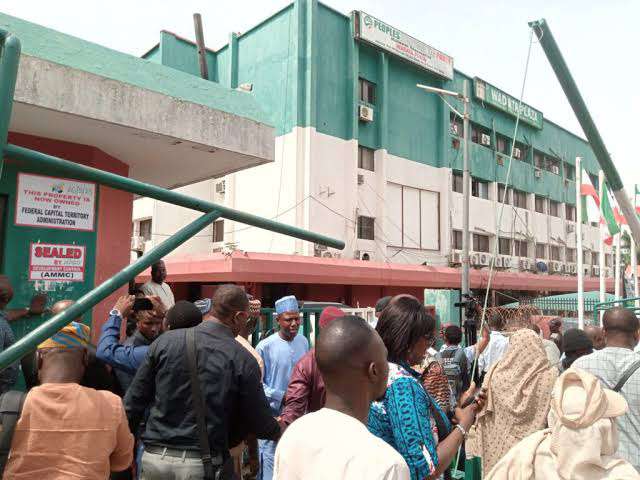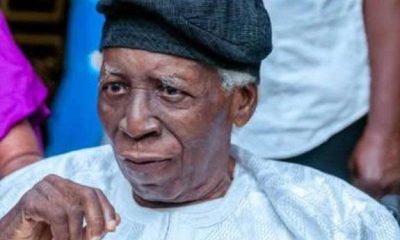Politics
2027: Opposition Parties Disintegrate

– PDP, LP, NNDP, ADC in Disarray
Nigerians are no longer in doubt about the weakness of the opposition parties, which are battling internal crises that may deepen their problems ahead of 2027. With the main opposition party, the People’s Democratic Party (PDP), splitting last week at the centre, and other parties like the Labour Party and the NNDP in shambles, the APC stands unchallenged for the 2027 polls. This, to a large extent, now portends a bleak future for Nigeria’s democracy and could turn the country into a one-party state.
Already, the situation is tilting in that direction as opposition parties witness a gale of defections of their leading members to the ruling APC. As of October 2025, the APC, from all indications, appears to have succeeded in gaining inroads into all geopolitical zones, a development that remains worrisome and dangerous for the future of democracy and opposition politics in Nigeria.
As the biggest party in Nigeria, the problem in the PDP mirrors and demonstrates the challenges facing the opposition. In the National Assembly, where the opposition initially controlled a majority of 148 to 120 seats in the House of Representatives after the 2023 elections, the numbers have now dwindled to a minority.
Minority to Majority
Presently, the APC has turned its minority position in 2023 into 205 seats, thanks to defections from opposition parties, especially the PDP, which has suffered major setbacks, leaving it with just 37 seats. This has given the APC a comfortable two-thirds majority to dominate the House on any issue.
In the Red Chamber, the Senate, which has 109 seats, the opposition initially controlled 50 while the ruling APC had 59. The opposition, mostly from the PDP, has since seen its number drop from 50 to 34 seats, with the APC now boasting 75 senators and still counting. More defections have further depleted the opposition and weakened its presence in the Senate.
The majority members of the House of Representatives had met at the Transcorp Hilton Hotel in Abuja in May 2023, where they called themselves the “Greater Majority” and pledged to work collectively for the interest of Nigeria and to provide effective opposition to the APC-led government of President Bola Ahmed Tinubu. But now, contrary to their pledge, the Greater Majority has shrunk to the “Greater Minority,” a clear indication that they have betrayed themselves and the trust Nigerians placed in them.
In fact, they have now teamed up with the APC minority to form the “Task Force” to carry out the bidding of the ruling government – defecting without regard to the rule of law or the Constitution, which they had vowed to uphold.
Section 68(1)(g) of the Constitution provides that a member of the Senate or House of Representatives shall vacate his seat if he becomes a member of another political party before the expiration of his term, unless such a move is due to a division in his original party or a merger with another.
Against the Constitution
Section 109 carries similar provisions for state Houses of Assembly. Sections 68(2) and 109(2) further mandate the Senate President or Speaker to enforce these provisions once satisfactory evidence is presented.
However, these constitutional provisions have been ignored by legislative leaders over time, as they are often the beneficiaries of defections. In 26 years of defections, no seat has ever been declared vacant by presiding officers, contrary to constitutional requirements.
LP’s Missed Chance
It was further argued that if the Labour Party and the PDP had not found themselves in disarray, the current situation might not have arisen. Public commentator and former Press Secretary to the late Oyo State governor, Dr. Omololu Olunloyo, Elder Moses Olorode, told Business Hallmark that if Peter Obi had remained focused and consolidated the Labour Party without allowing infiltration, it could have become the hope of Nigerians, especially the youth.
He argued that with the Labour Party coming from nowhere to secure as many as six million votes in its first major political outing, the party showed significant promise. He said the party’s 25% in the 2023 presidential election- winning 11 states, including Lagos, which Tinubu had controlled for over 25 years, and Delta State, the home state of the former PDP vice presidential candidate who has now defected to the APC – could have been a foundation for a formidable opposition if well managed.
Elder Olorode also criticised Alhaji Atiku Abubakar and Mallam Nasir el-Rufai of the African Democratic Alliance (ADC), which many believed could also have provided strong opposition. He argued that Atiku has “never been a stable politician” and has failed to provide strong leadership in any party he joined due to personal ambition. According to him, Atiku would have been in a better position today if he had stayed in the PDP and helped build it into a formidable party capable of surviving whether in power or not.
He also blamed past PDP leaders for abandoning the party after using it to win elections.
On El-Rufai, he said, “I don’t know what he wants, and I doubt if he can drive any opposition party in Nigeria. But mind you, he is a politician to watch.”
ADC Not Better
Also commenting on the situation, the spokesperson of the ADC and former Minister of Youth and Sports, Mallam Bolaji Abdullahi, agreed that the opposition parties are presently weak. According to him, the situation is dangerous, with the APC controlling about 27 states and holding the majority in the National Assembly. He argued that this trend is gradually weakening democratic competition, claiming that the APC-led government has been doing everything possible to destabilise the opposition.
“You can see from the gale of defections that the APC is gaining the upper hand,” he said. However, he added that if the opposition closes ranks, the ongoing defections may not necessarily translate to victory for the incumbent president in 2027.
Some analysts believe the APC should not yet rely on its current gains through defections, as things may change after party primaries. As is typical in Nigerian politics, those who feel cheated in the primaries may defect to other parties where their ambitions can be realised, since politics in Nigeria remains driven more by personal interest and the quest for power than ideology or service.




